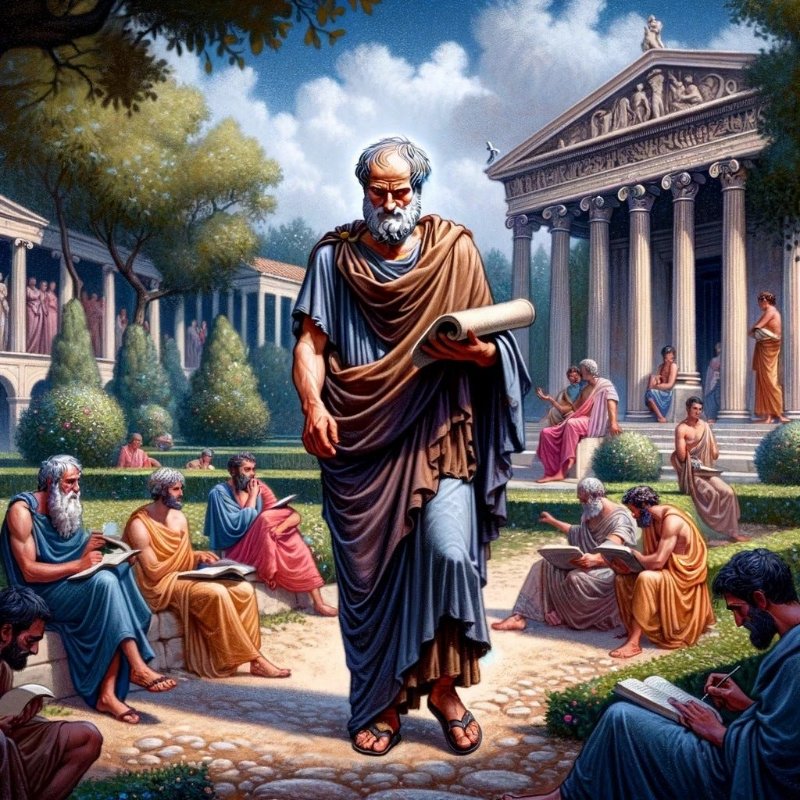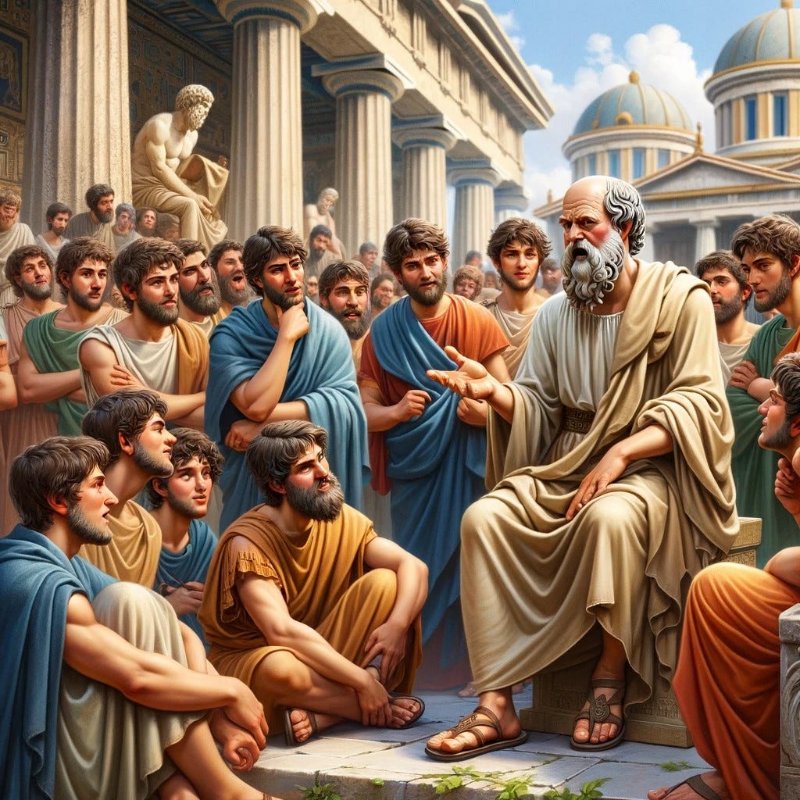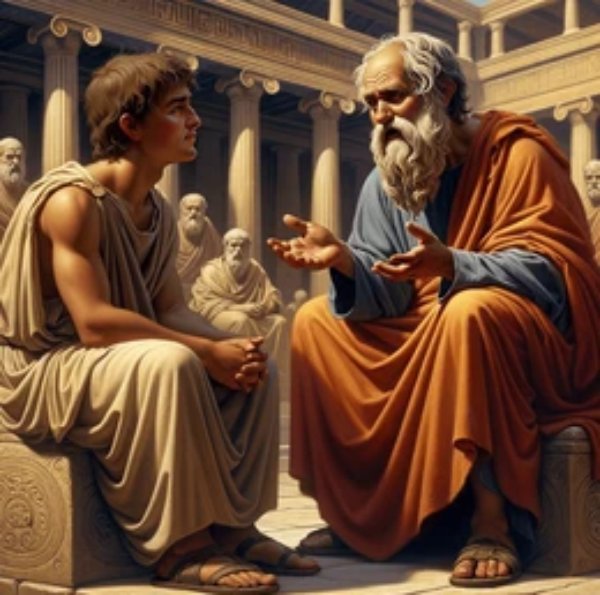Story of Socrates
The Quiet & The Questioning Philosopher
 Socrates painted picture standing and walking
Socrates painted picture standing and walkingSocrates was one of the earliest ancient Greek philosophers who shaped the early philosophy of life.
He was one of history's most influential philosophers, whose ideas and methods helped to shape modern thought and education.
He left no writings of his own, but his teachings have greatly influenced Western philosophy, making him an important figure in human intellectual history.
Socrates Early Life and Background
Socrates was born in 470 BCE in Athens, Greece.
He came from a modest background. His father, Sophroniscus, was a stonemason, and his mother, Phaenarete, worked as a midwife.
This humble beginning later influenced his philosophical approach.
He often drew parallels between his mother's profession of delivering babies and his own role in helping to "deliver" wisdom from people's minds.
He grew up in Athens during its Golden Age, young Socrates benefited from the city's rich cultural and intellectual environment.
Athens was then at its height of power and prosperity under the leadership of Pericles, fostering an atmosphere of artistic and philosophical innovation.
Education and Early Career
Details about Socrates' formal education are limited, but as an Athenian citizen, he likely received the standard education of the time, which included gymnastics, music, reading, writing, and the study of poetry.
He was particularly interested in the pre-Socratic philosophers and their investigations into the nature of the universe.
Socrates also worked as a stonemason for some time following his father's profession.
Some sources suggested he was quite skilled at his craft and may have helped create some of the sculptures that adorned the Acropolis.
However, he eventually felt some intrinsic pull that attracted him to a different purpose i.e. the pursuit of wisdom and truth.
Military Service and Family Life
Before dedicating himself fully to philosophy, Socrates served with distinction in the Athenian army during the Peloponnesian War.
He fought in several battles, including the Siege of Potidaea and the Battle of Delium, where he gained a reputation for his courage and endurance.
His military service demonstrated his commitment to civic duty and his physical fortitude.
Around the age of 50, Socrates married Xanthippe, who was much younger than him.
They had three sons: Lamprocles, Sophroniscus, and Menexenus.
His marriage to Xanthippe has become legendary, as ancient sources often portrayed her as ill-tempered and argumentative.
However, Socrates reportedly claimed that he chose her deliberately, believing that if he could get along with her, he could get along with anyone.
Socrates Philosophical Method and Teaching
 Socrates sitting with students and having a dialogue
Socrates sitting with students and having a dialogueSocrates developed a unique approach to philosophy and teaching that came to be known as the Socratic method.
This approach involved asking probing questions to stimulate critical thinking and illuminate ideas.
Rather than lecturing his students, he engaged them in dialectical conversations, helping them discover knowledge through their own reasoning.
Unlike the Sophists of his time, who charged fees for their teachings, Socrates never accepted payment for his philosophical discussions.
He conducted his inquiries in public spaces, engaging with anyone willing to participate in philosophical dialogue.
His students came from various social classes, though many were from wealthy and influential Athenian families.
Key Philosophical Ideas
Socrates' philosophy centered on several key principles:
1. The pursuit of wisdom and self-knowledge
2. The importance of questioning assumptions and examining beliefs
3. The relationship between virtue and knowledge
4. The concept that true wisdom lies in knowing what you don't know
5. The belief that virtue is the most important pursuit in life
His famous statement "I know that I know nothing" (often called Socratic ignorance) exemplified his approach to wisdom and learning.
He believed that recognition of one's own ignorance was the first step toward true knowledge.
The Oracle at Delphi
A pivotal moment in Socrates' life came when his friend Chaerephon visited the Oracle at Delphi and asked if anyone was wiser than Socrates.
The Oracle replied that no one was wiser.
Puzzled by this proclamation, Socrates embarked on a mission to prove the Oracle wrong by finding someone wiser than himself.
This quest led him to question various people who were considered wise, ultimately concluding that while they claimed to know many things, they actually knew very little.
This experience reinforced his belief that true wisdom lies in recognizing one's own ignorance.
Controversy and Trial
Socrates' method of questioning authority and encouraging young people to think critically eventually led to controversy.
His challenges to traditional beliefs and his association with individuals who later became enemies of democracy in Athens made him increasingly unpopular with the city's democratic leadership.
In 399 BCE, at the age of 70, Socrates was brought to trial on charges of impiety and corrupting the youth.
The charges were politically motivated, reflecting both personal animosity and genuine concern about his influence on young Athenians.
Instead of having the opportunity to propose exile as an alternative punishment, Socrates chose to defend his principles.
Death and Legacy
Socrates was found guilty by a narrow margin by the Court. He was sentenced to death by drinking hemlock.
He accepted his fate with remarkable composure, using his last days to continue philosophical discussions with his friends and followers.
His death, as described in Plato's dialogue "Phaedo," became a powerful symbol of integrity and commitment to philosophical principles.
Socrates' legacy lives on through the writings of his students, particularly Plato, who documented many of his conversations and ideas.
His influence can be seen in:
1. The development of Western philosophy and ethical theory
2. The establishment of logical reasoning as a method of inquiry
3. The creation of systematic approaches to education
4. The emphasis on self-examination and critical thinking
5. The connection between knowledge and virtue
Impact on Modern Thought
 Socrates having a one on one counseling session
Socrates having a one on one counseling sessionSocrates' influence extends far beyond ancient philosophy.
His methods and ideas continue to shape modern education, law, and ethical thinking.
The Socratic method is still used in:
- Law schools for developing critical thinking skills
- Psychological therapy for self-examination
- Educational settings for promoting active learning
- Business for problem-solving and decision-making
- Scientific inquiry for testing hypotheses
Written Legacy
Although Socrates himself never wrote anything down, his ideas and methods have been preserved through the writings of others, primarily:
1. Plato's dialogues, which present the most comprehensive picture of Socrates
2. Xenophon's historical works and philosophical texts
3. References in Aristotle's writings
4. Mentions in contemporary comic plays, particularly those of Aristophanes
Philosophical Influence
Socrates' philosophical impact can be seen in numerous schools of thought:
- The development of Platonic philosophy
- The foundation of various Hellenistic philosophical schools
- The evolution of Western ethical theory
- The development of educational theory
- The emergence of philosophical counseling
Contemporary Relevance
In today's world, Socrates' teachings remain remarkably relevant:
1. His emphasis on questioning assumptions helps combat misinformation
2. His focus on self-knowledge supports personal development
3. His method of dialogue promotes better communication
4. His ethical framework provides guidance for moral decisions
5. His approach to education encourages critical thinking
Wrap Up
Socrates' life and death represent a turning point in human intellectual history of philosophy.
He was fully committed to stick to truth, wisdom, and ethical behavior, even in the face of death.
He set a standard for philosophical inquiry that continues to inspire.
Even without any primary original writings by him, his influence still spread far and beyond through his students and passed down through generations.
He has shaped the development of Western thought and continues to influence how we think about knowledge, education, and ethics today.
His famous statement that "the unexamined life is not worth living" provides insight in his lasting message.
That is the importance of continuous questioning, learning, and self-improvement.
In this era as we know that the self help and improvement industry is booming.
That is all due to the reason that we need to find ourself first. The power of self knowledge leads to the greater truth about this life and perhaps hereafter that Socrates had advocated long time back.
You may also read about Socrates on Wikipedia
You can read about more History Articles at IdeasBeat